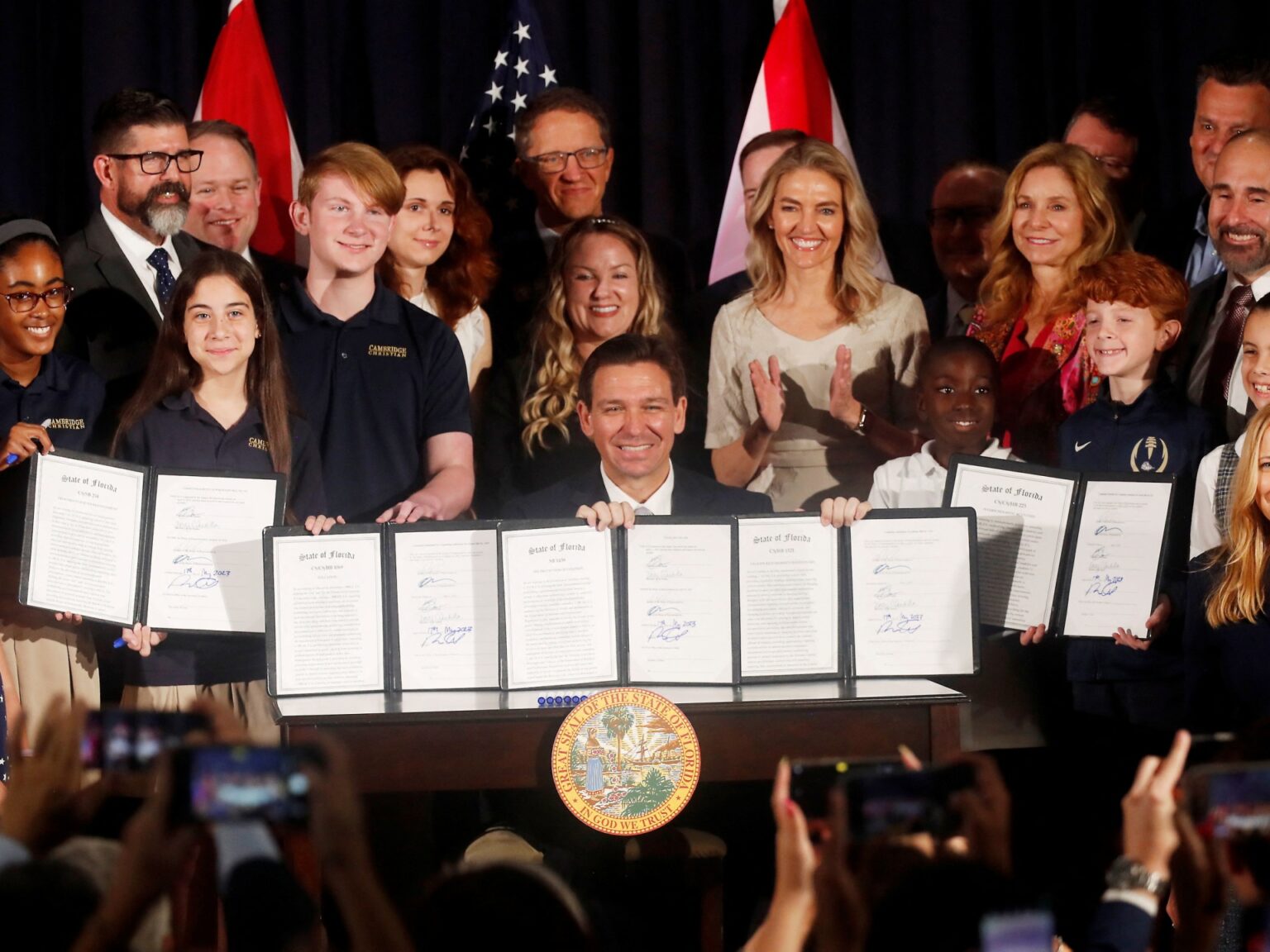Global Courant 2023-05-25 20:38:43
Washington, DC — Republican Governor Ron DeSantis vows to bring his “Florida blueprint” of conservative policymaking to the federal government as he seeks his party’s 2024 presidential nomination.
That “blueprint” has been in the making since DeSantis took office in Florida in early 2019, with the governor using his powers and the Republican majority in the legislature to push his staunchly right-wing agenda into law.
DeSantis, who has emerged as former President Donald Trump’s most serious challenger in the Republican primary, officially launched his presidential bid Wednesday in a Twitter announcement plagued with glitches and technical difficulties.
But his campaign will certainly hope to shift the focus back to his perceived performance in the Sunshine State.
Here, Al Jazeera looks at five key right-wing policies that helped DeSantis cement his stature in conservative American politics.
The ‘Don’t say gay’ bill
Last year, DeSantis signed a bill that would restrict discussions of sexuality and gender identity in Florida schools.
Dubbed the “Don’t Say Gay” bill by critics, the legislation sparked outrage from liberal advocates who argued the restrictions could marginalize and harm young students who identify as LGBTQ+.
“Classroom education by school staff or third parties about sexual orientation or gender identity may not take place in kindergarten through 3rd grade or in any manner that is not age or developmentally appropriate for students in accordance with state standards,” the legislation said. .
The bill allowed parents to file lawsuits against school districts if they believed the law was being broken.
It also requires school officials to inform parents “if there is a change in the student’s services or monitoring regarding the student’s mental, emotional, or physical health or well-being.”
In April, the Florida Board of Education expanded the law to apply to all grades, not just elementary school children.
Conservatives have argued that it is part of a wider push to give parents more say in their children’s education, especially when it comes to issues such as sexuality and gender identity.
The law — whose official name is Parental Rights in Education — drew criticism from Walt Disney Company executives, prompting DeSantis to strip the company of its special tax district status.
That action against Disney turned into a highly publicized, protracted legal and political battle that drew further praise from conservatives who see many companies increasingly embracing liberal social issues.
Abortion ban
Last month, DeSantis passed one of the toughest abortion bans in the country — a ban on the procedure in Florida after six weeks of pregnancy. It followed a 15-week suspension he had signed a year earlier.
Restricting abortion is another key issue for conservatives who saw the push as a call to protect the lives of the “unborn”. Liberals, however, have said abortion bans infringe on women’s bodily autonomy and rights to privacy and health care.
The law was criticized by rights groups who stressed that many women don’t even know they are pregnant after six weeks.
“Signing this bill into law is a serious government interference in people’s personal lives. Floridians, not politicians, should be free to decide what is best for ourselves, our families and our future,” the Florida chapter of the American Civil Liberties Union (ACLU) said in a statement after the bill was signed.
But DeSantis said he was “proud to support life and family” in Florida.
Even Trump, who has often prided himself on appointing three conservative justices to the U.S. Supreme Court – leading to the overturning of the constitutional right to abortion, has suggested that the six-week ban may be “too strict”.
Law against immigration
Earlier in May, DeSantis signed into law a bill that his office called “the strongest anti-illegal immigration law in the country,” requiring companies with more than 25 employees to implement a system that ensures their employees are undocumented.
The legislation also prohibited Florida municipalities from issuing ID cards to people who do not have regular status.
In addition, the law required “hospitals to collect and submit data on the cost of providing health care” to undocumented immigrants.
The bill, which came two weeks before DeSantis announced his presidential run, seized on Republican anger over a surge in arrivals of migrants and asylum seekers at the U.S. southern border.
Last year, DeSantis along with other Republican state leaders funded the relocation of asylum seekers to largely liberal parts of the country. He chartered two flights to transport dozens of migrants and asylum seekers from Texas to Martha’s Vineyard, an affluent community in the northeastern state of Massachusetts.
The move sparked outrage and questions about the legality of the transfer. Democratic President Joe Biden’s White House denounced the incident as vicious “political theater” at the time.
US presidential candidate Ron DeSantis has said his leadership in Florida shows what he can do for the US (File: Scott Audette/Reuters)
Targeted diversity programs
Earlier this month, DeSantis signed a bill to block federal and state funding for programs aimed at ensuring diversity, equality, and inclusion (DEI) at public universities, fueling a conservative push against such initiatives.
He denounced DEI programs as part of a “relatively recent” effort to impose an “ideological agenda” on educational institutions.
“DEI stands better for discrimination, exclusion and indoctrination. And that has no place in our public institutions,” DeSantis said.
The legislation prohibits instructions that teach “identity politics” or “theories that systemic racism, sexism, oppression, and privilege are inherent in the institutions of the United States and are created to perpetuate social, political, and economic inequalities.”
In the past few years, many American universities have embraced DEI programs and training to enhance diversity in their ranks and better serve the needs of minority students and faculty.
Democratic state legislator Anna Eskamani called the legislation “destructive” and said it “suppresses academic freedom and brings conservative political orthodoxy into the classroom.”
Relaxing gun regulations
Despite recent mass shootings and increasing gun violence across the country, DeSantis signed into law in April to further relax Florida’s gun regulations.
The legislation made it legal for people to carry guns without a permit from the state. “Constitutional Carry is on the books,” DeSantis said in a terse statement at the time.
Gun restrictions are the source of ideological schism between Republicans and Democrats.
Democrats have called for stricter regulations to stop gun violence, while many Republicans see gun ownership as a non-negotiable right guaranteed by the Second Amendment to the US Constitution.
The White House denounced Florida’s law, calling it “disgraceful.”
“This is the opposite of common sense gun safety. The people of Florida — who have paid a high price for the inaction of the state and Congress on guns from Parkland to Pulse Nightclub to Pine Hills — deserve better,” White House Press Secretary Karine Jean-Pierre said. in a statement at the time, citing previous crimes. shootings in Florida.
(TagsToTranslate)News




